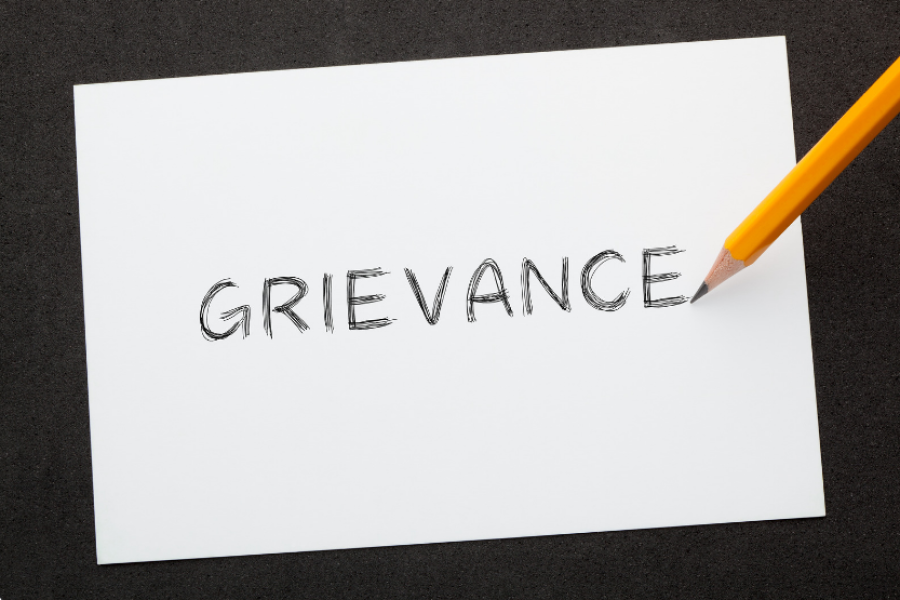Blog

Blog
Call us today for a free initial consultation on 0800 772 0341
What to do when an employee raises a grievance
Published 30 August 2022

An employer faces many difficult challenges in the current climate and among them dealing with a formal grievance from an employee can be problematic.
All organisations should have a grievance procedure in place that informs employees how to raise a grievance.
A grievance is a concern, problem or complaint that an employee may want to take up with you, which is called 'raising a grievance' [1 cited 30.8.22]
Any member of staff can raise a grievance at any time if they feel aggrieved about a work-related matter.
There is no legally binding process that you must follow when handling a grievance.
But it is vital that you are prepared and ready to deal with any formal grievance.
The saying by Benjamin Franklin that ‘failing to prepare is preparing to fail’ is certainly true when it comes to how you react to a formal grievance [2 cited 30.8.22]
You should have staff who are fully trained to deal with grievances. If not, then you should seek expert advice to assist you to do so.
The types of grievances raised in the workplace can be regarding pay and benefits, workload, working conditions or stem from interpersonal issues such as bullying and discrimination.
There are some principles you should observe when dealing with an employee grievance.
The ACAS Code of Practice provides guidance you should follow to manage a grievance in a fair manner [3 cited 30.8.22]. It is the minimum you should follow for handling such issues in the workplace.
A grievance process can be stressful for everyone involved. It can be particularly distressing and unsettling for the employee who has submitted the complaint, and also for any individuals implicated in the grievance.
As an employer you have a duty of care to all employees, which means you should take all steps which are reasonably possible to ensure their health, safety and well-being [4 cited 30.8.22]
You should be non-judgemental when dealing with an employee grievance, manage cases carefully, be sensitive to the circumstances and the needs of the individuals concerned and not make assumptions about any aspects of the case.
Deal with issues promptly and do not unreasonably delay meetings, decisions or confirmation of those decisions.
Arrange a grievance hearing to allow the employee to fully explain their concern and to ensure that you clearly understand the nature of it.
The worker submitting the grievance has a statutory right to be accompanied at a hearing [5 cited 30.8.22] . It can be by a colleague or trade union representative, but you should fairly consider any request to be accompanied by someone not in either category e.g. family member or friend.
Following the grievance hearing you should then carry out any necessary investigations, to establish the facts of the case. If necessary seek clarification on any points that are unclear and re-interview the complainant and witnesses if needed.
Inform the employee of the outcome of the investigation and allow them to appeal against any formal decision made.
If a grievance centres on problems in the working relationship between any number of employees, then mediation/conflict resolution through an independent third party can sometimes help to resolve the issues and repair the relationship.
If you fail to deal with a grievance fairly, especially when it involves unlawful treatment you run the risk of an employment tribunal claim.
For example, a grievance alleging any type of discrimination that is found proven can result in an employee being awarded compensation, which is uncapped [6 cited 30.8.22]
In recent years a bank worker found to have suffered disability discrimination and other unfavourable treatment at work was awarded £4.5m [7 cited 30.8.22]
Having to deal with an employee who raises a grievance is never easy, but it is essential that you handle it promptly and fairly, and navigate the process professionally and effectively.
A reputation built on success
If you're facing any of the issues in this article - or need guidance on disciplinary, grievance, or redundancy matters - call us today. Our expert Trade Union Representatives are available to represent you in crucial workplace meetings, with pay as you need support.